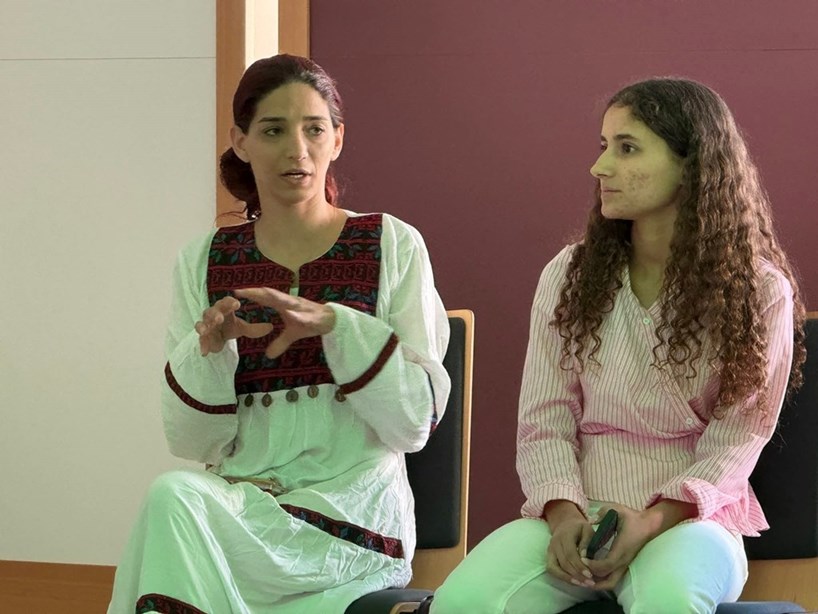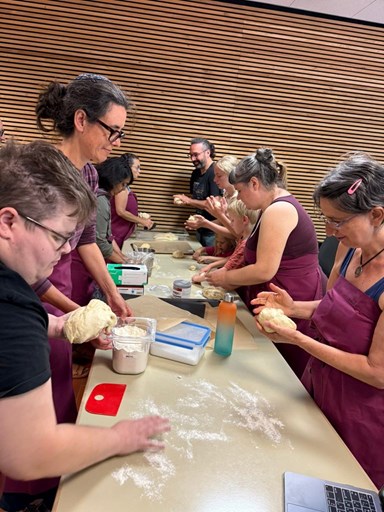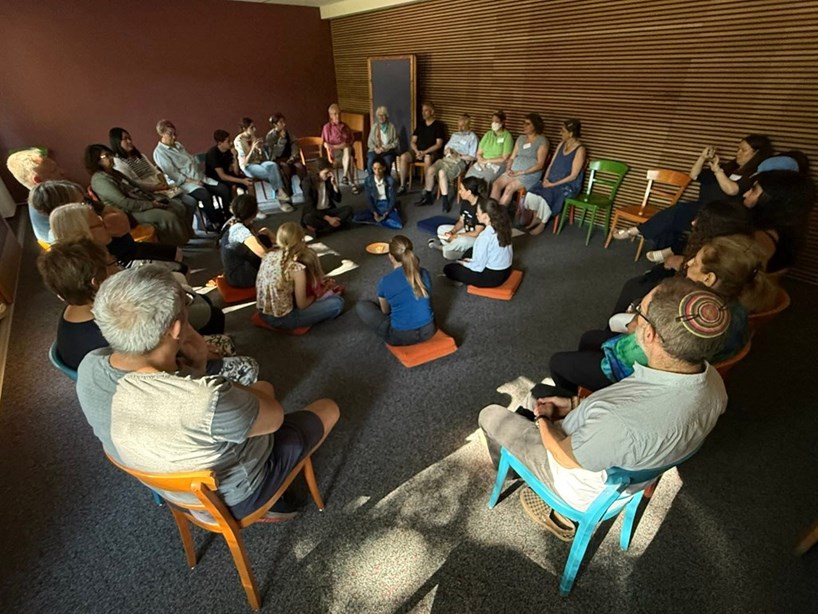“ORGANISING for 15 young people, convincing their parents for them to go with you [to Germany] . . . the tickets, flights, accommodation — it’s always hard. But this year was the most terrible,” says Lina Fauor, a Palestinian-Israeli Muslim actor, teacher, and political activist on FaceTime.
We speak when she is in Istanbul, with a party including her mother and seven Palestinian teenagers, aged between 12 and 17, who are travelling back to Israel-Palestine after attending the 52nd International Jews, Christians, and Muslims in Dialogue (JCM) Conference, in Vallendar, Germany, in June.
JCM was born in 1962 from the friendship of Rabbi Lionel Blue and Winfried Mächler, then pastor of the Dietrich Bonhoeffer Church in London. They felt driven to explore together how the church could most effectively and sincerely support the Jewish community, transforming immediate post-war guilt. Their dialogue continued after Mächler’s return to Berlin, drawing in the Muslim scholar Salah Eid, and the Roman Catholic theologian Anneliese Debray.
Over the years, JCM has formed a network with allied conferences, including the Jewish-Christian Bible Week in Osnabrück, Germany, as well as JCM partner conferences in Africa and Asia. This year’s African conference in Zanzibar coincided with the Vallendar event, sharing lectures and Jewish services.
The seven-day conference seeks to create an environment ripe for dynamic dialogue, friendship, and personal discovery and change among members of the three Abrahamic faiths from across every continent, culminating with Friday, Saturday, and Sunday worship across all the faiths. Keynote addresses by representatives of each faith focus on themes such as “Have We Failed God?” and interreligious dialogue, including “What is Home?” and “Response to a Broken World”.
 © JCM in Dialogue/photo by Katarzyna KowalskaLina Fauor (left) and one of the Palestinian teenagers join a discussion at JCM
© JCM in Dialogue/photo by Katarzyna KowalskaLina Fauor (left) and one of the Palestinian teenagers join a discussion at JCM
This year’s conference addressed the theme “Peace in a Time of Conflict”. Plenary sessions and forums follow the lectures, with additional project groups exploring the parallels and relationships between scriptures, singing, and drama. Diverse dialogue groups, including participants from various backgrounds, are an essential feature. These groups provide a confidential space for open and sometimes challenging and difficult conversations, intended to support an authentic, rich, and engaging experience.
THAT atmosphere of possibility and openness has brought Ms Fauor back again and again. For 11 years, she has been strongly committed to the work, bringing a new group of young people each time. “I feel that the people at JCM respect others,” she says. “When there is respect, you can share your own opinions, and others accept you as you are.” For her, this meant — even as the current conflict in the Middle East intensified — that there was no question of not attending.
“Two days before we were due to travel, the war began between Israel and Iran. My windows were shaking in their frames. People said, ‘How can you go?’ I said, ‘We will go.’ The air company cancelled our tickets. I spoke to the parents and children and said, ‘We will still go. Even if we have to go by sea, even if we have to swim, I’m still going.’ We went to Sharm El-Sheikh by minibus.”
It was not a journey for the faint-hearted. “Whenever we heard alarms, we had to get out of the minibus, lie in the street with our hands on the backs of our heads, and pray, thanking God when we survived, ‘Alhamdulillah!’”
The journey became more challenging. “When we crossed to the Egyptian side, the students were cleared, but the official refused to clear me.” Lina’s fiancé is Egyptian; the authorities may have been uncomfortable about their intention to marry because of Lina’s Israeli passport.
They faced an impasse. “We couldn’t go in, but they didn’t want to refund our payments either. I offered to pay something else, to go straight to the Sharm El-Sheikh airport and fly out the next day. They still said, “No. You cannot go one step from here.” It was impossible to go back. It was night; the bombs were falling. . . We had another idea. We could perhaps get into Jordan from Eilat.”
 © JCM in Dialogue/photo by Katarzyna KowalskaSome of those attending JCM work together to make challah bread for the shabbat service
© JCM in Dialogue/photo by Katarzyna KowalskaSome of those attending JCM work together to make challah bread for the shabbat service
The party returned to Israel, arranging another minibus to Aqaba. “But the border was closed. We had to sleep in the street. We had to get more clothes out of our luggage. The children had to go to the toilet behind a tree.”
Six hours later, “we paid to cross through again. Always, every step we took, we had to pay more.” Then, another complication: “When we were waiting, one of the students made a joke. She held her hand up and asked God for some money because we’d been on the road for two days and spent so much. She was being satirical, but a security official was annoyed because she had made the joke close to the King of Jordan’s portrait. He said this was disrespectful. Eventually, the girl apologised, and I received a formal warning. Then we were allowed to fly from Amman, although we had to wait for three days as flights were cancelled again and again.”
The children’s parents had different reactions to the struggles on the journey. “Some contacted me, saying they wanted their children back, whilst others said that they felt it was actually safer for their children to remain with us.” Ultimately, six children returned home at this point, and the other seven continued the journey, flying on to Istanbul and then Germany.
“We arrived at JCM on the Wednesday evening [the conference had started on Monday]. It felt as if we were finally at home.” The children immediately appreciated JCM’s atmosphere, Ms Fauor says: “Once we arrived, the children contacted their parents and told them about the differences between the five days of travelling and JCM itself, which was very positive.”
“We wanted to smile, to cry. . . I wanted to hug everyone. . . So many people had said, ‘You won’t make it, you can’t go.’ But I knew we had to go on. When we arrived it was like home, I was with my family again. When we finally arrived at JCM, I told them how thankful I was to have food, water, a shower. I never thought that I’d be in that situation.”
THOSE of other faiths who attended also extol its importance. Malte Möring, a Christian participant, values the common sense of mutual understanding during the conference. “The longer I go to JCM, and the deeper I know other people who regularly attend, the more I ask myself why we don’t meet more frequently.” JCM provides a great deal of potential contact, through plenary groups, lectures, shared meals, and dialogue groups, in which participants can speak openly, sometimes for the first time, with followers of other faiths.
For Möring, this does not dilute his Christianity: “When I feel surrounded by Jews and Muslims, whom I trust, and who I see struggling with aspects of their traditions, and who worship God nevertheless, I feel empowered to do that, too. . . To me, Jesus is alive. At JCM, people see me and celebrate my Christian faith, and I am there to see them, to celebrate them in the same way, with the fullness of their faith in Allah, the fullness of their obedience to the Eternal One.”
 © JCM in Dialogue / photo by Katarzyna KowalskaA prayer meeting attended by all three faiths at JCM 2025
© JCM in Dialogue / photo by Katarzyna KowalskaA prayer meeting attended by all three faiths at JCM 2025
Despite inevitable debates about many religious issues, there is one topic on which there is agreement: peace. “There’s a shared sense of belonging together. So, if it’s true that we all belong together, you can’t build security for Israel on the back of Palestinians, just as you can’t liberate Palestine without Israel. We belong together.”
Dr Moshe Lavee is a lecturer at Haifa University, a longstanding JCM participant, and now a team member. “JCM 2025 was an extraordinary experience,” he says.
“Two days before the conference, war broke out between Israel and Iran; it became clear that we wouldn’t be able to participate as planned. Worse still, on the second night of the war, an Iranian missile struck the home of a Muslim Arab Israeli student, killing her along with her sister, mother, and aunt. She had been expected to join the 2026 conference. Beyond any specifically Jewish or Israeli perspective, JCM 2025 was marked by this human tragedy we were experiencing.
“We had to attend the conference via Zoom. Sometimes, we had to run to shelters, as well as travel to offer condolences to the student’s father. As the Jewish lecturer this year, I addressed the question of dealing with biblical verses and concepts of vengeance — how to stand before these ideas in wartime, to experience ourselves as Abraham, who is commanded firstly to slaughter Isaac, and then to refrain from slaughtering him, to understand that we are being tested. Can we listen to the second call rather than the first?”
Lina Fauor echoes this sentiment, commenting on the part that interfaith dialogue can play in supporting peace in the Middle East. “When you respect and listen, understand what others need, you will know that the war must end. I hope that our story, even though it’s not as hard as the stories of the children who have died, still makes a difference, because all that has happened in the war . . . it really is enough.”
The next JCM conference (jcmconference.org) is planned for February 2026 with a focus on “Faithful Dissent: Self-Criticism and commitment across religious traditions”.
















